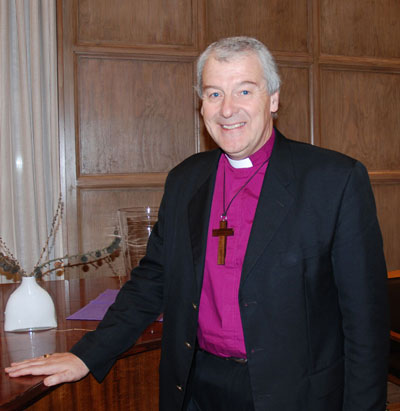News
Bishop of Clogher attends Oslo Seminar
Bishop of Clogher attends Oslo Seminar

Bishop Jackson was invited to lead a seminar in the Diaconal Institute (Diakonhjemmet
Hogskole) Oslo, on Reconciliation and the Churches in Ireland on Thursday
3rd December 2009. In a broad-ranging paper Bishop Jackson set the historical
context of relationships across the churches in Ireland and explored aspects
of the troubles and the era since the Belfast/Good Friday Agreement.
In his lecture Bishop Jackson said that the combination of religious affiliation
and political loyalty in Ireland distorts the openness of religion to give
voice to diversity as a core principle in church life. The onset of post-modernity
brings pressure to bear on assumptions which have remained un-examined in
an enclosed society over many generations. Social isolationism in both Northern
Ireland and in the Republic of Ireland - for different reasons - has served
the population ill in terms of a model of adaptation and transformation of
society.
He went on to say that reconciliation is woven into the life of every individual
Christian and of each church. The distinct absence of a theological substratum
to church-based religion in Ireland has meant that churches do not meet to
agree or disagree sufficiently for creativity to blossom among them as structured
monoliths. Therefore, the most principled work of reconciliation by individuals
or by institutions is not woven into the public personae of the churches.
The churches together still need urgently to break down the barriers dividing
them one from the other to make a conscious witness particularly to those
who do not practise religion in any way other than as a cultural badge of
identity.
Responses were made by members of staff with specialist interests in social
anthropology (Professor C. Bawa Yamba), political science (Professor Idar
Magne Holme) and human rights (Professor Hans Morten Haugen).
Bishop Jackson, who chairs the Council of the Church of Ireland Theological
Institute and the Ministry Formation Group of the Bishops, opened up discussions
with members of staff of the Diaconal Institute on ways in which there might
be collaboration between the two Institutes in the spirit of the Porvoo Common
Statement. The Reverend Dr Stephanie Dietrich (Church of Norway), who worked
on the Common Statement in the 1990s, is now a member of staff in the Diaconal
Institute. Bishop Jackson has been a regular contributor to the work of the
Porvoo Ministry Group. Both the Anglican Communion and the Lutheran World
Federation have constituent members whose churches are small in number. The
hope is that through collaboration, particularly in the area of distance
learning, both church families might share resources and training as well
as their being opportunities for exchange of students between the two Institutes.
This discussion has been made possible because the M Theology degree for
which Church of Ireland ordinands now study, as of September 2009, is accredited
at level 9 in the National Framework of Qualifications. Therefore it is at
the same level of academic attainment as is the degree for which Lutheran
deacons and priests work in their ministerial training, making modular interchange
easier. Dr Jackson also had an opportunity to celebrate Holy Communion in
the Diaconal Institute and to hold discussions with lifelong church deacons
in the Church of Norway.